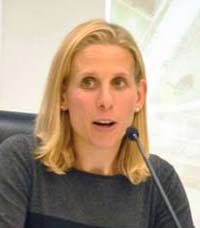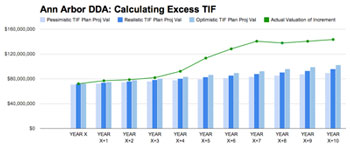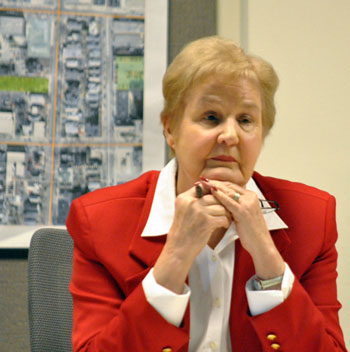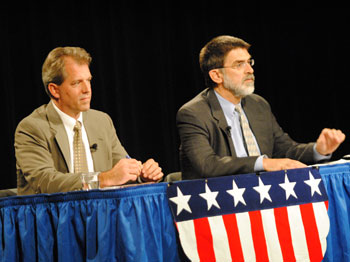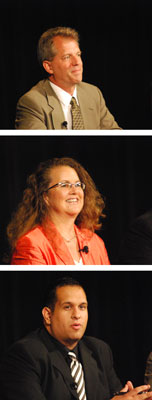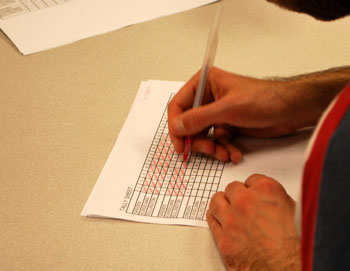Dems Forum Part 3: Connections
Editor’s note: A forum hosted by the Ann Arbor Democratic Party on Saturday, June 8, 2013 drew six of seven total city council candidates who’ve qualified for the primary ballot.
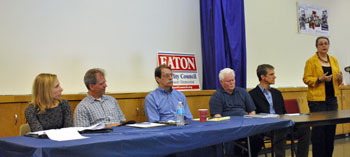
From left: Julie Grand (Ward 3 challenger), Stephen Kunselman (Ward 3 incumbent), Jack Eaton (Ward 4 challenger), Mike Anglin (Ward 5 incumbent), Kirk Westphal (Ward 2 candidate), Sabra Briere (Ward 1 incumbent).
In the Aug. 6 Democratic primary, only two wards offer contested races. In Ward 3, Democratic voters will choose between incumbent Stephen Kunselman and Julie Grand. Ward 4 voters will have a choice between incumbent Marcia Higgins and Jack Eaton. Higgins was reported to have been sick and was unable to attend.
The format of the event eventually allowed other candidates who are unopposed in the Democratic primary to participate: Mike Anglin (Ward 5 incumbent), Sabra Briere (Ward 1 incumbent), and Kirk Westphal, who’s challenging incumbent Jane Lumm in Ward 2. Lumm, who was elected to the council as an independent, was in the audience at the forum but didn’t participate. The event was held at the Ann Arbor Community Center on North Main Street. The Chronicle’s coverage is presented in a multiple-part series, based on common threads that formed directly in response to questions posed to the candidates, or that cut across multiple responses.
One question posed to candidates explicitly involved transportation: What do we do to implement an effective transportation plan for Ann Arbor that would decrease congestion and encourage alternative modes of travel? But transportation fit into a broader set of themes at the forum that could be collected under the notion of “connection” – connectedness of citizens not just to physical locations, but to their local government.
Candidates had clearly prepared to talk about the topic of transportation generally. Jack Eaton criticized last year’s demised countywide planning effort, based on the fact that other communities were not asked to defray the costs of that planning. At the same time he called for better maintenance of roads, partly out of concern for bicyclist safety. He also called for more frequent bus service during extended hours – but cautioned that he was focused on spending Ann Arbor’s local transit millage money on transit in Ann Arbor.
As far as millages go, Mike Anglin was clear that he would vote for a possible new millage resulting from the admission of Ypsilanti to the Ann Arbor Transportation Authority. However, Anglin was emphatic that he did not support trains, but rather only buses – with a focus on moving people around inside the city.
Julie Grand said she was glad that the possibility of adding rail service was being studied, and that by council resolution, the question of possibly using the Fuller Road site for a new train station would go to the voters. She pointed out that the park advisory commission, on which she serves, focuses on the potential for non-motorized connections when it considers parcels to acquire as parkland. She called transit a regional issue, but said that ultimately we need to focus on transit within the community.
Stephen Kunselman was specific with a suggestion of how to return a focus to the city’s own transportation needs: Remove the city’s transportation program manager, Eli Cooper, from the AATA board – so that Cooper could focus on issues like sidewalk gaps and bicycle lanes. Kunselman also stated that he would be proposing that the city council rescind its memorandum of understanding with the University of Michigan to build a parking structure as part of the Fuller Road Station project.
Although UM has withdrawn from participation in that project under the MOU, Kunselman said he wanted to “kill it.” That way, he said, the conversation could turn away from using the designated parkland at the Fuller Road Station site as a new train station, and could instead be focused on the site across the tracks from the existing Amtrak station.
Sabra Briere ventured that the community did not have a consensus about the basic question of what kind of transportation system is best for Ann Arbor – one that was geared primarily to commuters or one that was designed mainly for city residents as a replacement for personal automobiles.
Kirk Westphal told the audience that he’d chosen a house to buy in Ann Arbor based on its proximity to a bus line. He ventured that the transportation system needs to be robust enough to attract people out of their cars, and that to be financial viable, a certain amount of density is required. It’s important to support development near transit lines to provide that density, he said.
In addition to the question about connecting people to physical locations (i.e., transportation), candidates at the forum responded to a question about connecting people to local government. The question was specific to involving youth in local government. But candidates also delivered a range of comments throughout the forum related to the theme of connecting residents to government.
Among the specific suggestions was one from Westphal, who floated the idea of a “citizens academy” for general government along the lines of Ann Arbor’s citizens police, courts and fire academy.
Part 1 of this series focused on the candidates’ concept of and connection to Ann Arbor, while Part 2 looked at their personal styles of engagement and views of how the council interacts. Other themes from the forum will be presented in subsequent reports. Chronicle election coverage is tagged with “2013 primary election.” [Full Story]




